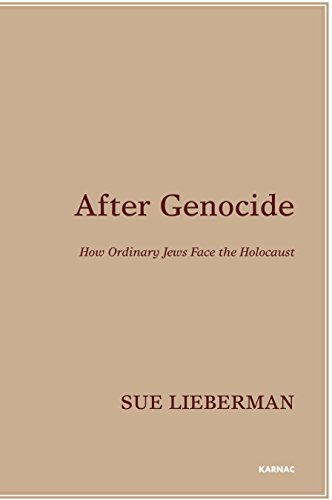After Genocide: How Ordinary Jews Face the Holocaust

Book Details
- Publisher : Routledge
- Published : 2014
- Cover : Paperback
- Pages : 272
- Category :
Psychoanalysis - Category 2 :
Culture and Psychoanalysis - Catalogue No : 35943
- ISBN 13 : 9781782201922
- ISBN 10 : 1782201920
Reviews and Endorsements
‘This is a wonderful exploration of why we as “ordinary Jews”, to use a term from the book, are still so interested in exploring our feelings towards the Holocaust. “My family may not have gone through the Holocaust, but I am related to it.” Why is our relationship to the Holocaust still so strong after so many years? We are taken through the trauma of loss, guilt, shame, fear, and confusion in a moving way, made profoundly real by the experiences of individuals who ask the questions we all ask ourselves. It is a highly professional, literary, and enlightening journey on how we cope with the past.’
— Judy Sischy, an “ordinary Jew”
‘Trauma is an ever-present theme for counsellors and psychotherapists, where it is most-often thought about in relation to individual clients and patients. After Genocide offers an original analysis of the long-term impacts of the Holocaust, not for the descendants of those directly affected but for the more numerous “ordinary Jews” on whom Sue Lieberman focuses. Exploring often-perplexing traces of loss, anger, fear, guilt, shame, and other powerful feelings, she offers a lucid and evocative account of the captivating horror of the Holocaust. These insights will provide important resources for practitioners, as well as being an important addition to the academic literature.’
— Professor Liz Bondi, Head of Counselling Studies, Edinburgh University
‘The navigation of “collective trauma” is one of the hardest explorations psychoanalytic studies can undertake. When the “collective trauma” is specifically trammelled by the Holocaust and thus possesses the minds and experiences of Jews – whether they be survivors, descendants of survivors, or even those not directly touched in safe havens – the endeavour becomes all the more difficult, all the more complex, all the more variable. It is on this odyssey that Sue Lieberman bravely embarks in After Genocide.’
— Moris Farhi, writer and novelist
‘As someone who had read very little about the Holocaust, this book has opened my eyes to what it is like to be Jewish in the west today, and how much the Holocaust continues to affect Jewish people.’
— Sue Collin, retired adult education tutor
‘Like most people, I knew the Holocaust had happened but had not really engaged with its huge meanings and implications for myself, for all humanity, and for the Jewish community in particular. Reading Sue Lieberman’s book changed all that. In her careful and clear style, she explores the deeper psychological and cultural implications of the horrors of the Holocaust, and raises challenging reflections about the enduring emotional trauma and legacy caused by such a huge rent in our usual expectations of human society. In the context of an emotional landscape involving complex feelings such as shame, rage, and fear, Sue suggests that it is in the talking about and speaking to our feelings personally and culturally that they can be transformed rather than re-enacted. Sue writes about these hugely complex processes in a remarkably measured and thought-provoking way. Reading this book expanded my understanding of hatred, humanity, and healing, and I am grateful for the experience.’
— Sue MacFadyen, psychotherapist

